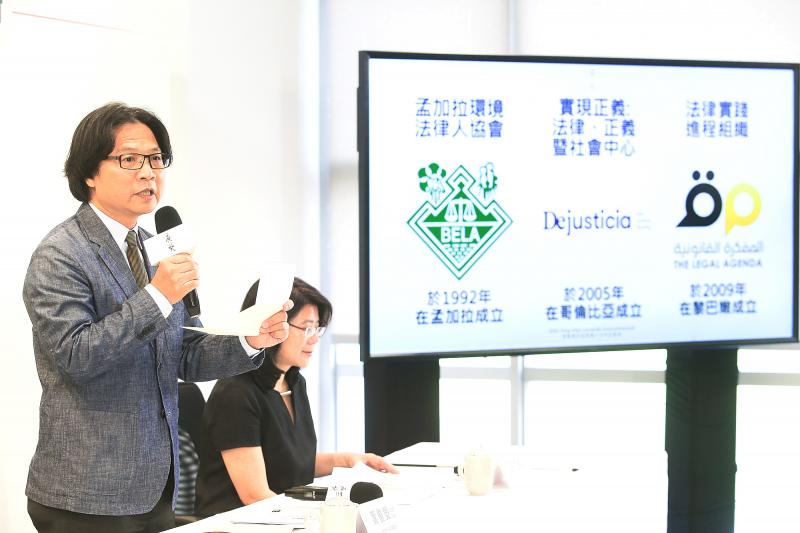Three overseas non-governmental organizations (NGOs) — the Bangladesh Environmental Lawyers Association (BELA), Colombia-based Dejusticia, and Lebanon-based The Legal Agenda — have won this year’s Tang Prize for their significant contributions to the rule of law, the Tang Prize Selection Committee announced yesterday.
The NGOs were given the prize “for their efforts in furthering the rule of law and its institutions through education and advocacy,” according to the award citation released by the Tang Prize Foundation.
The organizations have shown exemplary perseverance in promoting greater individual, social and environmental justice in areas where the foundations of the rule of law are severely challenged, the foundation said.

Photo: CNA
Established in 1992, BELA is dedicated to promoting environmental justice and developing sound environmental jurisprudence in Bangladesh, the committee said in a statement.
The NGO promotes “rule of law and environmental justice through public interest litigation, advocacy, research and publication, as well as capacity-building for actors in the public sector and civil society,” the committee said.
BELA has initiated more than 250 public interest lawsuits and advocated for legislative reform on environmental justice.
Among the issues it has covered are river pollution, industrial pollution, vehicular pollution, illegal construction, labor welfare, illegal mining, wetland protection, prevention of soil erosion, reduction of plastic use, and prevention of ship pollution, the committee said.
The association was in June 2003 listed on the UN Environment Program’s Global 500 Roll of Honor for generating broader awareness about environmental law and environmental justice.
In 2009, BELA chief executive Syeda Rizwana Hasan was awarded the Goldman Environmental Prize for her public interest work in environmental conservation.
Sharing the Tang Prize is the research and advocacy organization Dejusticia, which was founded in 2005 and has made important contributions to the rule of law with its relentless campaigns, the committee said.
Dejusticia “efficiently combines rigorous academic research with energetic social action on human rights issues,” and is “deeply committed to social change through activism informed by research,” the committee said.
The organization aims to strengthen rule of law through litigation, notably filing and winning landmark cases on sensitive issues such as discrimination (race and gender), indigenous peoples’ rights, the rights of refugees, transitional justice and environmental degradation, the committee said.
It said that the group has litigated cases in Colombian courts and in international legal forums across Latin America.
The Legal Agenda, established in 2009, has “successfully strengthened judicial independence and the rule of law in Lebanon through a multidisciplinary approach,” the committee said.
Its main activities include monitoring the functions of the judiciary, advocating for legislative change and promoting a stronger societal fabric in support of judicial independence, it said.
The organization speaks for marginalized groups and promotes legal protection for migrant workers, refugees, LGBT groups, and the families of victims of forced disappearances, the committee said.
It has also done significant work in promoting social awareness about the protection of rights and the rule of law, the committee said, adding that its pioneering approach has expanded beyond Lebanon to other Arab countries.
The Tang Prize was established by Taiwanese businessman and philanthropist Samuel Yin (尹衍樑), chairman of the Ruentex Group, and was first awarded in 2014.
Every two years, the Tang Prize celebrates achievers in four fields — sustainable development, biopharmaceutical science, Sinology and rule of law.
A week-long program revolving around the award ceremony is to begin on Sept. 20.

Alain Robert, known as the "French Spider-Man," praised Alex Honnold as exceptionally well-prepared after the US climber completed a free solo ascent of Taipei 101 yesterday. Robert said Honnold's ascent of the 508m-tall skyscraper in just more than one-and-a-half hours without using safety ropes or equipment was a remarkable achievement. "This is my life," he said in an interview conducted in French, adding that he liked the feeling of being "on the edge of danger." The 63-year-old Frenchman climbed Taipei 101 using ropes in December 2004, taking about four hours to reach the top. On a one-to-10 scale of difficulty, Robert said Taipei 101

Nipah virus infection is to be officially listed as a category 5 notifiable infectious disease in Taiwan in March, while clinical treatment guidelines are being formulated, the Centers for Disease Control (CDC) said yesterday. With Nipah infections being reported in other countries and considering its relatively high fatality rate, the centers on Jan. 16 announced that it would be listed as a notifiable infectious disease to bolster the nation’s systematic early warning system and increase public awareness, the CDC said. Bangladesh reported four fatal cases last year in separate districts, with three linked to raw date palm sap consumption, CDC Epidemic Intelligence

US climber Alex Honnold left Taiwan this morning a day after completing a free-solo ascent of Taipei 101, a feat that drew cheers from onlookers and gained widespread international attention. Honnold yesterday scaled the 101-story skyscraper without a rope or safety harness. The climb — the highest urban free-solo ascent ever attempted — took just more than 90 minutes and was streamed live on Netflix. It was covered by major international news outlets including CNN, the New York Times, the Guardian and the Wall Street Journal. As Honnold prepared to leave Taiwan today, he attracted a crowd when he and his wife, Sanni,

Two Taiwanese prosecutors were questioned by Chinese security personnel at their hotel during a trip to China’s Henan Province this month, the Mainland Affairs Council (MAC) said yesterday. The officers had personal information on the prosecutors, including “when they were assigned to their posts, their work locations and job titles,” MAC Deputy Minister and spokesman Liang Wen-chieh (梁文傑) said. On top of asking about their agencies and positions, the officers also questioned the prosecutors about the Cross-Strait Joint Crime-Fighting and Judicial Mutual Assistance Agreement, a pact that serves as the framework for Taiwan-China cooperation on combating crime and providing judicial assistance, Liang